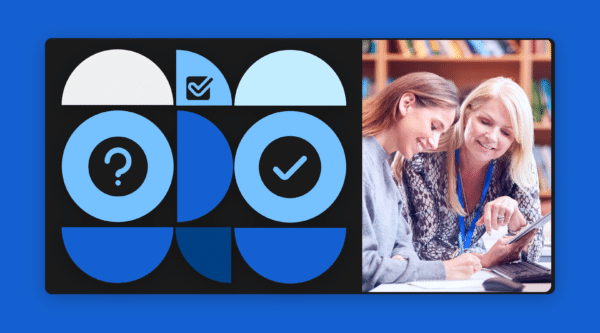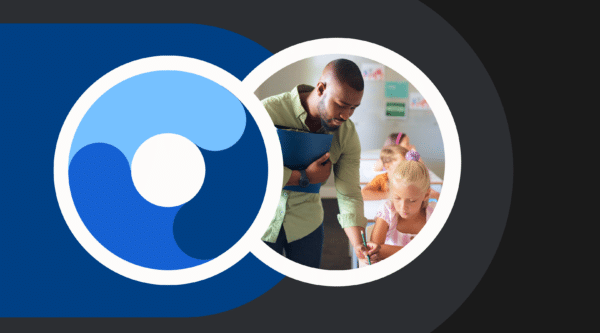

Teresa Engler, instructional technology coach in McGuffey School District, walks through her day’s responsibilities for ensuring every teacher has opportunities to learn professionally, no matter where they are in their career.
I serve as the K-12 instructional technology coach at my school district of four schools and more than 1,500 students. I meet regularly with nearly 160 professional staff and teachers, all of whom I help support in some capacity or another. Learn what a typical day looks like, and how my role expands beyond my daily duties.
Daily Routine
My typical workday begins at the crack of dawn with a coffee in one hand and my cell phone in the other. I check text messages and emails, answer questions, and put out fires before I even leave my house. Once I reach the school building, the real magic happens.
Morning Rounds
I make it a point to visit all four schools—two elementary schools, one high school, and one middle school—and walk room to room, personally checking in with everyone. This is the most valuable and meaningful time of the day for me. I refer to this as informal or in-the-moment coaching. Every conversation I have is based on these three questions:
- How are you?
- What can I do for you?
- What do you need?
It’s a great way to make connections and build relationships, and it often leads to meaningful discussions, planning activities together, scheduling meetings, or coaching opportunities.
#LunchOnLine
Every week, I offer an informal presentation called #LunchOnLine, where I invite teachers to a 30 minute Google Meet that focuses on a specific topic, app, or tool. These presentations aren’t always run by me: I sometimes invite companies and experts in the field to speak.
One of the key elements is that I make it a point to tap into our district’s expertise, asking teachers to share their own best practices and preferred strategies for implementing meaningful lessons with students in their classrooms. Involving leaders in our organization promotes collaboration that spreads across teams, grade levels, and departments by taking the coach’s focus and placing it on the teachers showcasing ways they are addressing challenges. It’s a win-win for everyone!
Coaching Cycles
I spend the remainder of the day in meetings with teachers. Coaching is completely voluntary with teachers signing up for cycles via an initial survey sent to staff during the first few weeks of school. Teachers may select formal coaching or informal coaching and ask to be on a cycle or simply request pop-in visits now and then.
During an 8-week cycle, I schedule meetings with teachers to discuss challenges and possible strategies to implement with students, set up quick classroom visits to observe lessons, and schedule reflection meetings which allow the coach and teacher to examine what worked and what to focus on for the next challenge.
Social Media Break
Social media outlets such as Twitter, Facebook, and Instagram have been a game-changer for me. I find myself following specific hashtags and relying upon various “Edustars” to help me navigate some of the challenges my teachers face. I’m particularly fond of those times when I serendipitously stumble upon a tip or a trick while scrolling through various posts. Those are the most valuable finds: you didn’t realize you needed it until you stumbled upon it.
Resource Curator
I also carve out time for administrative tasks. These tasks include logging time with teachers, researching strategies, adding resources to a shared Google Classroom, or creating brief tutorials designed to introduce new apps or tools, or address immediate questions and concerns that arise during the day.
Final Note
To say my day is full is an understatement! Coaching is neither quick nor is it a fix. It’s a supportive partnership, guiding teachers as they navigate challenges and seek new methods to engage learners and increase student achievement. There’s a lot to do, but I wouldn’t have it any other way.
About Our Guest Blogger
Teresa Engler is a K-12 instructional technology coach in the McGuffey School District. In addition to her role, she is a Google Certified Teacher, a Google Certified Coach, and a part of the Dynamic Learning Project. Outside of her organization, Teresa is a Keystone Technology Integrator (KTI) involved with Southwest Region – PAECT and has begun a series of online training opportunities with #LunchOnLine where she invites colleagues to share their educational experiences. Teresa has presented about coaching and The Dynamic Learning Project at Pete&C, participated in the Google for Education Playground in Philadelphia where she presented topics about integrated technology in middle school ELA classes and using digital badges with K-12 teachers, and continuously shares her passion for EdCamp by being active on Twitter via #edcampRL.
Be sure to follow Teresa on Twitter @MrsEngler1!
Stay Connected
News, articles, and tips for meeting your district’s goals—delivered to your inbox.





